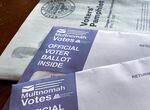For months, Portland’s volunteer charter review commission has been the group nabbing headlines as members put together a package aimed at overhauling the city’s government and election system.
All the while, with very few taking notice, Multnomah County’s comparable commission has been quietly working on its own momentous change: a ballot measure that could give residents who are not U.S. citizens the right to vote in local elections.

An OPB file photo of Multnomah County ballot envelopes and a voters’ pamphlet.
Jeff Thompson / OPB
Since last September, the county’s Charter Review Committee — a 16-person volunteer group convened once every six years — has been considering what changes they want to make to the county’s governing document.
This month, the committee agreed to send three major amendments to the November ballot.
The first would remove gendered language from the charter. The second would implement ranked-choice voting for Multnomah County races by 2026, similar to what Portland’s charter commission has proposed for city elections.
And the third — bound to be the most consequential and controversial — would let people who are not U.S. citizens have a say in picking the county’s leaders.
If voters pass the measure, experts say Multnomah County will be the first jurisdiction in Oregon to give noncitizens the right to vote. The county would join a very small club of local governments that have allowed such a sweeping expansion of voting rights. Others include Montpelier in Vermont, nearly a dozen cities in Maryland, and New York City.
Similar efforts to expand enfranchisement have often met immediate legal challenges. Earlier this week, a State Supreme Court Justice said the New York law — set to go into effect next year — violated the state constitution and struck it down.
Charter committee member Samantha Gladu, who helped craft the charter change, said volunteers who studied the charter anticipate the Multnomah County measure will face legal challenges if voters approve it. When the committee recommended referring the measure to the ballot, the group noted that “negative impacts” could include a “potential legal challenge” as well as a “potential backlash against immigrants and non-citizens.”
Gladu emphasized the point was to get a broad measure on the ballot and let the courts give Multnomah County a roadmap on what was legally possible.
“The language we adopted in the recommendation is as broad as possible,” Gladu said. “Because of it being a legal gray area here in Oregon, we wanted to ensure that we’re able to figure out what is to the fullest extent legally possible.”
The charter committee ultimately recommended a ballot measure that would “extend the vote to the fullest extent possible allowed by law, including but not limited to noncitizens.”
County spokesperson Julie Sullivan-Springhetti said county attorneys have been drafting language for charter amendments that will follow the spirit of this recommendation. The committee is expected to vote on July 5 on the precise text of the amendment. The charter changes will also be presented to the Multnomah County Board of Commissioners before appearing on the November ballot, though county commissioners won’t be able to make any changes, according to Sullivan-Springhetti.
In March, Katherine Thomas, an assistant county attorney with Multnomah County, warned the committee that giving noncitizens the right to vote would be an undoubtedly bumpy road with “significant barriers” that could risk tying up Multnomah County in litigation. She said while the Oregon constitution used to allow some noncitizens to vote, legal changes made a century ago could be interpreted as a ban on noncitizens voting.
“Ultimately, it’s untested,” she told the committee. “I’m not aware that there is a local jurisdiction that has expanded voting to noncitizens. We don’t know how a court would necessarily treat that kind of proposal if it was challenged in court.”
The push by Multnomah County comes at a time of heightened debate across the United States over voting rights and restrictions. Some states have made aggressive moves to curb voting rights amid rising accusations of fraud and nativist sentiment, while other jurisdictions have pushed to enfranchise more residents.
Ricardo Lujan-Valerio, a policy director to Portland City Commissioner Carmen Rubio and former policy associate at ACLU of Oregon, has been working on enfranchising non-citizens in Oregon for the past few years and advised on the county ballot measure. He said he estimates it could potentially affect up to 100,000 people if the final definition of ‘noncitizen’ includes the roughly 22,000 undocumented residents living in Portland.
“We have to recognize they are part of our society in every aspect — whether it’s through their contributions through employment, through their memberships with faith communities, paying taxes, going to our school. In every way they’ve been incorporated in our society,” Lujan-Valerio said. “One way we haven’t done so is representation in our government.”
He said the Portland Charter Commission may follow suit. At a City Hall meeting earlier this week, a Portland Charter Commissioner member told council member Carmen Rubio that the group was considering looking at charter changes next year to enfranchise noncitizens.
